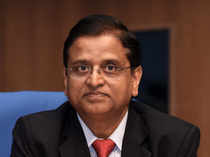 ETMarkets.com
ETMarkets.comThe basic mindset of the government at the policy level is still public sector oriented. Most of the ministers believe that the public sector entity should remain under their control, says Subhash Chandra Garg, Former Finance Secretary.
You have been in government and you know the push towards privatisation. You know about the political push back as well. What is the actual challenge to push through the process apart from the declarations of intent?
First thing we should remember is that the policy is decided by politicians, not by the bureaucrats or the civil servants. The decision to virtually make India or Indian industry, infrastructure and natural resources a reserve of the public sector was taken by the first Congress governments in the country. Before independence, Indian industry was largely private. There was not a single industry except railways and the post office in the public sector.
The politicians took that decision that socialism is good for the country and therefore muzzled the private sector, killed the private sector and brought everything under the public sector. The game was a bad one . This was leading India to a very unproductive kind of system and the results were there. In the first 40 years, we achieved a very low growth rate because resources were going in the public sector and it was functioning very inefficiently. This realisation came in 1991. Again, it was a political decision to change and allow the private sector to come and work along with the public sector whether it is in the airlines, telecom or IT.
The policy decision in 1991 was to allow the private sector in all sectors of the economy. The civil servants implemented that policy very well. Today, you have the private sector in every sector of the economy except what is reserved like atomic energy and some part of the railways which are reserved by political decision making. Now that the decision to privatise has been taken, I would suggest you look at the policy which has been announced.
In the last six years of the Modi government, there has been a clear intent to privatise/disinvest. We have already had attempts to sell for example Air India, BPCL, a lot of companies are on the block. Where is it getting stuck?
Air India is literally a very poor asset. It is a liability. For the last 2-3 years, attempts are being made to sell it. The other privatisation decision for BPCL, etc, came up only last year. For the first five years there was not a single privatisation. HPCL was sold to another public sector company. REC was sold to another public sector company the PFC. If you go through the transactions and the shareholders’ agreement, in both the cases even that public sector was not given the management control. HPCL took about one-and-a-half years to agree that ONGC is its promoter. PFC does not have management control over REC even today. So I do not think it is correct to say that there have been attempts to privatise in the last five years. This privatisation decision is only about one-and-a-half-year-old.
Some people argue that sectors like health and education should not be fully privatised. because then you may end up with low quality expensive options. The argument is not as simple as it seems, is it?
We should have a complete clarity on what the role of the government is. The role of the government is to do public goods and service. The production of private goods and services is not the role of the government. Most of the public sector is in the private goods and services production and distribution. You can get your people lifted out of Libya or elsewhere or by hiring out the capacity in the private sector. Much of the country has been kept going by the working from home, services delivered by the private sector. There is nothing inherently good or necessary for the public sector to remain in delivering services.
Coming to health and education -- these are classical merit goods and public goods which the government must be delivering. These are not private goods.
There is no need for the MTNL and BSNL or Air India to exist in the public sector. Allow those to be sold off for whatever it’s worth. I will again give you the same example of privatisation of six airports. There was no criticism about valuations, etc. The six transactions were done successfully. But after that, nothing has happened vis-a-vis privatisation of the next six airports. There is something problematic about the execution capacity.
The basic mindset of the government at the policy level is still public sector oriented. Most of the ministers believe that the public sector entity should remain under their control. It is not civil servants who are coming in the way. So if there is a clarity of decision at the highest level, then you will see privatisation taking place in the country.
Download The Economic Times News App to get Daily Market Updates & Live Business News.
Subscribe to The Economic Times Prime and read the Economic Times ePaper Online.and Sensex Today.
Top Trending Stocks: SBI Share Price, Axis Bank Share Price, HDFC Bank Share Price, Infosys Share Price, Wipro Share Price, NTPC Share Price
Download The Economic Times News App to get Daily Market Updates & Live Business News.
Subscribe to The Economic Times Prime and read the Economic Times ePaper Online.and Sensex Today.
Top Trending Stocks: SBI Share Price, Axis Bank Share Price, HDFC Bank Share Price, Infosys Share Price, Wipro Share Price, NTPC Share Price















 Get Unlimited Access to The Economic Times
Get Unlimited Access to The Economic Times
